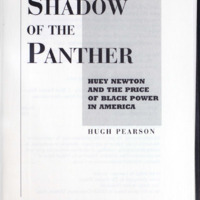-
Title
-
The shadow of the panther : Huey Newton and the price of Black power in America
-
Description
-
In the early morning of August 22, 1989, on the corner of Ninth and Center Streets in Oakland, Huey Newton faced Tyrone Robinson and two other drug dealers, asking them for crack. Robinson refused, took a 9-mm automatic from one of his companions and pointed it at Newton's head. Huey stood still and said, "You can kill my body, but you can't kill my soul. My soul will live forever!" Robinson shot him three times in the head. Huey Newton, once considered the nation's premier symbol of black resistance to the entire American power structure, was pronounced dead at 6:12 a.m. The Shadow of the Panther is the most ambitious, engaging, and balanced history of the Black Panthers to date. It is also an unflinchingly honest account of what amounts to human tragedy. Hugh Pearson's account of Huey Newton's rise to power and descent into addiction and powerlessness is set against a century-long quest for civil rights and empowerment. Beginning with the formation of the Brotherhood of Sleeping-Car Porters in the 1920s, Hugh Pearson then traces the development of civil-rights activism through a series of "Premier Negro Leaders" from Booker T. Washington, W. E. B. Du Bois, and Adam Clayton Powell, Jr., to Martin Luther King, Jr., Stokely Carmichael, and Malcolm X. The extraordinary progress and crushing defeats of the early- and mid-1960s set the stage for the rise of the Black Power Movement and its offspring, the Black Panther Party. The details of this evolution from nonviolence to violence, and, finally, to militarism, are presented here with clarity and insight, showing clearly how Black Power spelled the beginning of the end of the Civil Rights Movement, and paved the way for the emergence of the Panthers as the nation's primary symbol of black disenchantment. Through meticulous research and exclusive cooperation from many of those close to Newton, Pearson paints a detailed portrait of life in the Party. Newton's own opposing tendencies - the intellectual who earned a Ph.D. and the street thug - had parallels in the structure and activities of the Party: while creating positive change through political organization and community programs, the Party also had all the characteristics of a violent, repressive, gangster mob. Persistent problems with internal conflicts, the wide gap between Newton's elite corps and rank-and-file members, sexual abuse and mistreatment of women, and the abandonment, torture, and frequent murder of members and ex-members all contributed to the ultimate demise of the Party. The result is a fine-grained portrait of the complex and evolving relationship of revolutionary blacks and white leftist college students in the face of growing black militancy and the Vietnam War, and a vivid and varied cast of characters that includes Stokely Carmichael, James Forman, Bob Scheer, Elaine Brown, and David Horowitz. A powerful and undeniably bold take on an era both pivotal and persistent in the American consciousness, The Shadow of the Panther will no doubt be the benchmark for all future books on Huey Newton and the Black Panther Party.
-
Identifier
-
491122
-
201632780
-
Creator
-
Pearson, Hugh
-
Source
-
Brian Lamb Booknotes Collection
-
Gift of Brian Lamb, 2011.
-
Catalog record
-
Language
-
eng
-
Date
-
1994
-
Program air date: August 21, 1994.
-
Publisher
-
Addison-Wesley Pub. Co.
-
George Mason University. Libraries. Special Collections & Archives
-
Text
-
Transcription of Annotations
Notes on front endpaper: What's wrong with the name Huey. What does it mean to slay someone. Feb 1966--Malcolm X assassinated. Black Power-Stokely Carmichael. Underlinings/notes: Underlinings: Lamb underlines the names of early Panther members: Huey Newton, Landon Williams, Mary Kennedy, Felix Mitchell and civil rights activists: John Lewis, Bob Moses, James Firman, Stokely Carmichael, Bayard Rustan, Daisy Bates, Fannie Lou Hammer. Lamb underlines the progression of black rights from A. Philip Randolph and the Brotherhood of the Sleeping Car Porters--to W.E.B. DuBois's call for Negro soldiers to fight in WWI (36,000 did) . DuBois "slain" Booker T. Washington who inherited mantle of leadership from Frederick Douglass. I. Marcus Garvey. Randolph planned a Negro march on Washington. Followed by Adam Clayton Powell, Jr. and then Martin Luther King, jr. E.D. Nixon/Rosa Parks. Also marked is Mike Wallace's reporting of the criminal records of Malcolm X and Elijah Muhammad. Lamb underscores passages showing Newton's frustrations with society and the evolution on his thoughts on race and society. Lamb also charts the shift from civil rights to Black Power and away from non-violence--Black Panthers. FBI COINTELPRO investigation of Panthers--only fraction of the documents available. Notes: "Civil rights movement was born," "Lewis, Moses, Forman, Carmichael," " Negros with guns," "SNCC," "Freedom Riders," "John Lewis baseball bats," "Williams to China," "first militancy," "Moses arrested 1961," "Lee murdered," "Medgar Evers," "Huey P. Long," "Shop-ins," "Huey Newton stabs Odell Lee--jail six months," "SFS 9/28/64," "Don't trust anyone over 30." Lamb writes the names of notable names in the margins: Jimmy Lee Jackson, Malcolm X, Jim Reeb, Willie Ricks, H. Rap Brown, James Forman, Stokely Carmichael, Monster Cody/William Broyles, Cleaver/Scheer, Halberstam, Landon Williams, Mary Kennedy. "Rap promotes Black Panther party as heroes."
-
Subject
-
"Newton, Huey P."
-
"Black Panther Party--History."
-
"Black power--United States--History."
-
Relation
-
Original Booknotes interview
-
Rights
-
This work may be protected by copyright laws and is provided for educational and research purposes only. Any infringing use may be subject to disciplinary action and/or civil or criminal liability as provided by law. If you believe that you are the rights-holder and object to Mason’s use of this image, please contact speccoll@gmu.edu.
 491122.pdf
491122.pdf